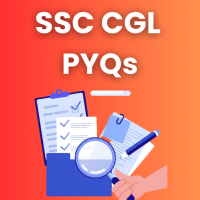SSC CGL Exam > SSC CGL Questions > Choose the correct transformation of the dire...
Start Learning for Free
Choose the correct transformation of the direct sentence: "He said, 'I can finish this task by tomorrow.'" into indirect speech.
- a)He says he could finish the task by the next day.
- b)He says he can finish the task by the next day.
- c)He said he could finish the task by the next day.
- d)He said he can finish the task by the next day.
Correct answer is option 'C'. Can you explain this answer?
Verified Answer
Choose the correct transformation of the direct sentence: "He said, 'I...
In transforming the given sentence into indirect speech, 'can finish' changes to 'could finish' to represent the conditional aspect from the perspective of the past. Therefore, the correct indirect speech is "He said he could finish the task by the next day."
View all questions of this test
Most Upvoted Answer
Choose the correct transformation of the direct sentence: "He said, 'I...
Understanding the Transformation to Indirect Speech
When converting direct speech to indirect speech, certain grammatical changes must be made. The sentence in question is: "He said, 'I can finish this task by tomorrow.'"
Key Changes in Indirect Speech
- Tense Shift: In indirect speech, the present tense "can" changes to the past tense "could."
- Pronoun Adjustment: The pronoun "I" changes to "he" to reflect the speaker's perspective.
- Time Reference Change: The word "tomorrow" transforms to "the next day" to maintain the correct time frame.
Analysis of Options
- Option a): "He says he could finish the task by the next day."
- Incorrect tense; "says" (present) should not pair with "could" (past).
- Option b): "He says he can finish the task by the next day."
- Incorrect; it uses "says" (present) but retains "can" (present), which does not match the original past context.
- Option c): "He said he could finish the task by the next day."
- Correct. It uses "said" (past), shifts "can" to "could," and changes "tomorrow" to "the next day."
- Option d): "He said he can finish the task by the next day."
- Incorrect; "can" remains in present tense, which is inconsistent with the past narrative.
Conclusion
The correct transformation is option C: "He said he could finish the task by the next day," as it properly reflects all necessary adjustments for indirect speech.
When converting direct speech to indirect speech, certain grammatical changes must be made. The sentence in question is: "He said, 'I can finish this task by tomorrow.'"
Key Changes in Indirect Speech
- Tense Shift: In indirect speech, the present tense "can" changes to the past tense "could."
- Pronoun Adjustment: The pronoun "I" changes to "he" to reflect the speaker's perspective.
- Time Reference Change: The word "tomorrow" transforms to "the next day" to maintain the correct time frame.
Analysis of Options
- Option a): "He says he could finish the task by the next day."
- Incorrect tense; "says" (present) should not pair with "could" (past).
- Option b): "He says he can finish the task by the next day."
- Incorrect; it uses "says" (present) but retains "can" (present), which does not match the original past context.
- Option c): "He said he could finish the task by the next day."
- Correct. It uses "said" (past), shifts "can" to "could," and changes "tomorrow" to "the next day."
- Option d): "He said he can finish the task by the next day."
- Incorrect; "can" remains in present tense, which is inconsistent with the past narrative.
Conclusion
The correct transformation is option C: "He said he could finish the task by the next day," as it properly reflects all necessary adjustments for indirect speech.

|
Explore Courses for SSC CGL exam
|

|
Question Description
Choose the correct transformation of the direct sentence: "He said, 'I can finish this task by tomorrow.'" into indirect speech.a)He says he could finish the task by the next day.b)He says he can finish the task by the next day.c)He said he could finish the task by the next day.d)He said he can finish the task by the next day.Correct answer is option 'C'. Can you explain this answer? for SSC CGL 2025 is part of SSC CGL preparation. The Question and answers have been prepared according to the SSC CGL exam syllabus. Information about Choose the correct transformation of the direct sentence: "He said, 'I can finish this task by tomorrow.'" into indirect speech.a)He says he could finish the task by the next day.b)He says he can finish the task by the next day.c)He said he could finish the task by the next day.d)He said he can finish the task by the next day.Correct answer is option 'C'. Can you explain this answer? covers all topics & solutions for SSC CGL 2025 Exam. Find important definitions, questions, meanings, examples, exercises and tests below for Choose the correct transformation of the direct sentence: "He said, 'I can finish this task by tomorrow.'" into indirect speech.a)He says he could finish the task by the next day.b)He says he can finish the task by the next day.c)He said he could finish the task by the next day.d)He said he can finish the task by the next day.Correct answer is option 'C'. Can you explain this answer?.
Choose the correct transformation of the direct sentence: "He said, 'I can finish this task by tomorrow.'" into indirect speech.a)He says he could finish the task by the next day.b)He says he can finish the task by the next day.c)He said he could finish the task by the next day.d)He said he can finish the task by the next day.Correct answer is option 'C'. Can you explain this answer? for SSC CGL 2025 is part of SSC CGL preparation. The Question and answers have been prepared according to the SSC CGL exam syllabus. Information about Choose the correct transformation of the direct sentence: "He said, 'I can finish this task by tomorrow.'" into indirect speech.a)He says he could finish the task by the next day.b)He says he can finish the task by the next day.c)He said he could finish the task by the next day.d)He said he can finish the task by the next day.Correct answer is option 'C'. Can you explain this answer? covers all topics & solutions for SSC CGL 2025 Exam. Find important definitions, questions, meanings, examples, exercises and tests below for Choose the correct transformation of the direct sentence: "He said, 'I can finish this task by tomorrow.'" into indirect speech.a)He says he could finish the task by the next day.b)He says he can finish the task by the next day.c)He said he could finish the task by the next day.d)He said he can finish the task by the next day.Correct answer is option 'C'. Can you explain this answer?.
Solutions for Choose the correct transformation of the direct sentence: "He said, 'I can finish this task by tomorrow.'" into indirect speech.a)He says he could finish the task by the next day.b)He says he can finish the task by the next day.c)He said he could finish the task by the next day.d)He said he can finish the task by the next day.Correct answer is option 'C'. Can you explain this answer? in English & in Hindi are available as part of our courses for SSC CGL.
Download more important topics, notes, lectures and mock test series for SSC CGL Exam by signing up for free.
Here you can find the meaning of Choose the correct transformation of the direct sentence: "He said, 'I can finish this task by tomorrow.'" into indirect speech.a)He says he could finish the task by the next day.b)He says he can finish the task by the next day.c)He said he could finish the task by the next day.d)He said he can finish the task by the next day.Correct answer is option 'C'. Can you explain this answer? defined & explained in the simplest way possible. Besides giving the explanation of
Choose the correct transformation of the direct sentence: "He said, 'I can finish this task by tomorrow.'" into indirect speech.a)He says he could finish the task by the next day.b)He says he can finish the task by the next day.c)He said he could finish the task by the next day.d)He said he can finish the task by the next day.Correct answer is option 'C'. Can you explain this answer?, a detailed solution for Choose the correct transformation of the direct sentence: "He said, 'I can finish this task by tomorrow.'" into indirect speech.a)He says he could finish the task by the next day.b)He says he can finish the task by the next day.c)He said he could finish the task by the next day.d)He said he can finish the task by the next day.Correct answer is option 'C'. Can you explain this answer? has been provided alongside types of Choose the correct transformation of the direct sentence: "He said, 'I can finish this task by tomorrow.'" into indirect speech.a)He says he could finish the task by the next day.b)He says he can finish the task by the next day.c)He said he could finish the task by the next day.d)He said he can finish the task by the next day.Correct answer is option 'C'. Can you explain this answer? theory, EduRev gives you an
ample number of questions to practice Choose the correct transformation of the direct sentence: "He said, 'I can finish this task by tomorrow.'" into indirect speech.a)He says he could finish the task by the next day.b)He says he can finish the task by the next day.c)He said he could finish the task by the next day.d)He said he can finish the task by the next day.Correct answer is option 'C'. Can you explain this answer? tests, examples and also practice SSC CGL tests.

|
Explore Courses for SSC CGL exam
|

|
Signup for Free!
Signup to see your scores go up within 7 days! Learn & Practice with 1000+ FREE Notes, Videos & Tests.


















